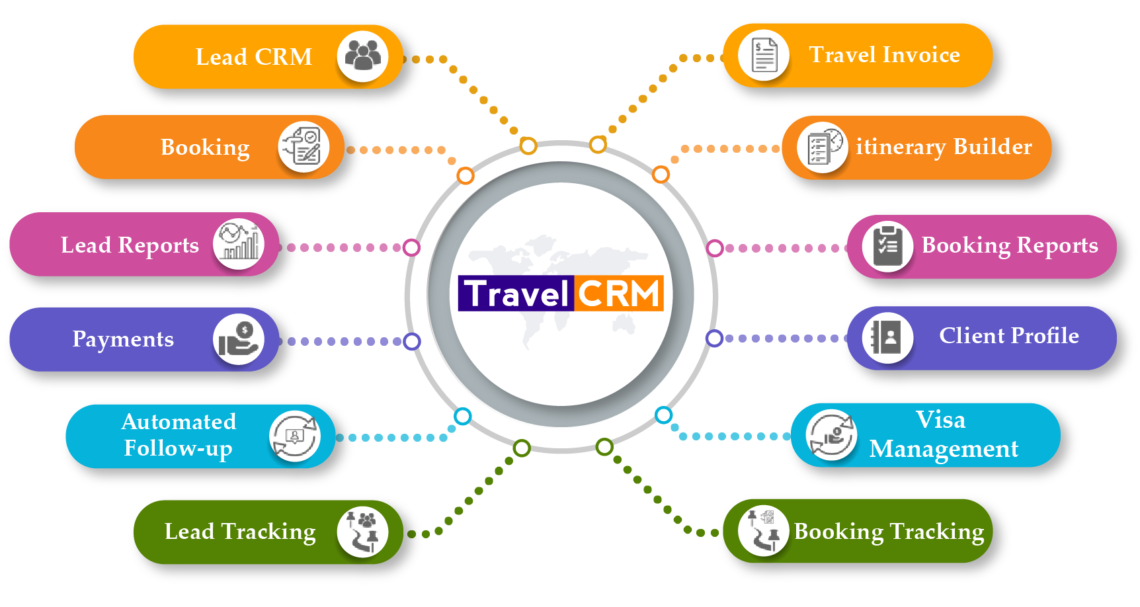In the highly competitive travel industry, providing excellent customer support is critical for building trust, retaining clients, and staying ahead of competitors. Travellers expect prompt and personalised service at every stage of their journey, from booking to post-trip follow-ups. A Travel Customer Relationship Management (CRM) system can help agencies meet these expectations by streamlining communication, organising client data, and enhancing overall customer support.
In this article, we’ll explore the key features of a Travel CRM that can significantly improve customer support for travel agencies.
1. Centralised Customer Database
One of the most important features of any CRM system is a centralised customer database. In a travel agency, clients interact with multiple touchpoints—whether it’s booking flights, asking for travel advice, or updating their reservations. A Travel CRM consolidates all client information into a single platform, including booking history, contact details, preferences, and past interactions.
With this centralised data, customer support agents can quickly access a complete view of a client’s history, enabling them to provide personalised assistance. This feature eliminates the need to manually search through different systems or emails, reducing response time and improving service quality.
2. Automated Ticketing and Case Management
A Travel CRM often comes with automated ticketing and case management tools to ensure no customer issue is overlooked. When a client submits a query or issue, the CRM automatically generates a ticket and assigns it to the appropriate team member. This ticket-tracking system allows agents to manage support requests efficiently by monitoring each case’s progress and ensuring timely resolution.
Additionally, CRM systems can prioritise tickets based on urgency or client type, ensuring that high-priority cases get immediate attention. Automation in case management also reduces human error, as agents are guided through a structured workflow that helps them follow up effectively.
3. Omnichannel Communication
Today’s travellers expect seamless communication across multiple channels—email, phone, social media, and even live chat. A Travel CRM with omnichannel communication capabilities allows agents to interact with clients across different platforms while maintaining a consistent record of conversations.
For example, if a client initially contacts the agency via email but later follows up on social media, the CRM will track all communications, ensuring that agents are always aware of the conversation history. This holistic view allows for better, faster responses and reduces the chances of miscommunication.
Omnichannel communication also helps travel agencies meet clients where they are, providing support in the way the client prefers, whether via messaging apps or phone calls.
4. Real-Time Updates and Notifications
Travel is often subject to sudden changes—flights get delayed, hotels are overbooked, and last-minute alterations are common. A Travel CRM system provides real-time updates and notifications that allow customer support teams to stay informed about such changes and communicate them to clients immediately.
For instance, if a flight gets rescheduled, the CRM will alert the agent, who can then notify the client and offer alternative arrangements. This ability to react quickly in real time ensures that clients are kept in the loop, reducing stress and enhancing the customer experience.
5. Personalised Customer Support
Personalisation is key to excellent customer support. A Travel CRM allows agents to offer personalised assistance by analysing the client’s past preferences, travel history, and previous interactions. For example, if a client regularly books luxury hotels, the CRM can prompt agents to recommend premium accommodations when the client inquires about a new trip.
Personalised support not only improves the customer experience but also fosters loyalty and repeat business. Clients appreciate being remembered and receiving recommendations tailored to their individual preferences, which makes them more likely to choose your agency again for future travel.
6. Self-Service Portals
Many Travel CRMs come with self-service portals, where clients can access their own bookings, make changes, or find answers to frequently asked questions. This feature is especially valuable for travellers who prefer to handle simple tasks on their own, such as modifying a hotel reservation or checking flight details.
Self-service portals empower clients by giving them control over their travel arrangements without having to wait for assistance from an agent. This reduces the workload on customer support teams and ensures that clients can resolve issues quickly, enhancing overall satisfaction.
7. Analytics and Reporting Tools
A Travel CRM is equipped with robust analytics and reporting features that allow agencies to track and measure customer support performance. Key metrics such as response times, case resolution rates, and customer satisfaction scores can be easily monitored.
By analysing these reports, agencies can identify bottlenecks in the support process and make data-driven improvements. For instance, if the average resolution time for support tickets is too long, managers can identify the cause—whether it’s due to a lack of resources or inefficient workflows—and make adjustments to speed up responses.
8. AI-Powered Chatbots
Many modern CRM systems now include AI-powered chatbots that can handle routine inquiries, providing immediate assistance to clients. These chatbots can answer common questions, help with bookings, and even escalate more complex issues to human agents when necessary.
AI chatbots are available 24/7, ensuring that clients receive prompt responses even outside of regular business hours. This feature improves customer satisfaction by offering immediate solutions to basic inquiries and reducing wait times for human support.
9. Integration with Other Tools
Travel agencies use various tools such as booking engines, accounting software, and marketing platforms. A Travel CRM often integrates with these systems, providing a seamless flow of information between departments. For example, if a client books a trip via the agency’s online portal, the CRM automatically updates the customer’s profile with the new information.
This integration ensures that customer support agents always have the most up-to-date data when assisting clients. It also reduces manual data entry, minimising the risk of errors and ensuring smooth communication between systems.
Conclusion
A Travel CRM is an indispensable tool for improving customer support in today’s fast-paced travel industry. With features like centralised data management, automated ticketing, omnichannel communication, real-time updates, and personalised support, agencies can provide the level of service that modern travellers expect. By leveraging these CRM features, travel agencies can not only enhance the customer experience but also build lasting relationships that drive business growth.





